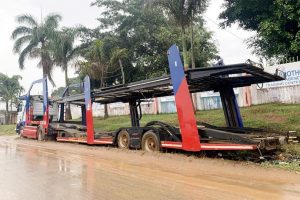
#OutToLunch: Superstition and witchcraft keeping Ugandans poor
By Denis Jjuuko Many years ago, a car carrier was parked on the side of the road that connects Kireka to Kyaliwajjala on the outskirts of Kampala. The car carrier, comprising of a truck head and trailer seemed to be still in good working conditions. Days turned into weeks, months and years with the truck still in its position, on the pavement facing the direction of Kireka. Nobody seemed to know the owner of the truck though some alleged it belonged to an entrepreneur who had died in the infamous “balance the boat” accident of a few years ago. At one time, stories go, authorities tried to tow it away but they brought a weaker towing truck probably with a team that didn’t know how to disengage it so that it can free wheel. Once they failed to remove it, the truck became a legend of myths. If you used a boda boda along this route, the rider would tell you all sorts of stories — that the truck speaks at night—like a human being and can even call out your name. That it was a sanctuary of all Uganda’s spirits. The truck was not only an eyesore, it had become a road safety hazard. Last Saturday, a young man involved in the Kampala auto show perhaps in a bid to promote his upcoming event decided to do something. Working with UNRA, he brought in a team of mechanics that knew how to disengage it and make it towable. Once he arrived on the scene, a sizeable crowd formed at a respectable distance. No boda bodas were willing to work in the area. They all wanted to witness history — not of a rocket trying to go to Mars or another planet but an old truck being towed away. One of Uganda’s leading television stations sent in a crew for live coverage. Journalists from many media houses arrived in droves to cover a truck being towed away. A bigger breathless crowd waited on X (formerly Twitter) in apparent anticipation of what may happen making it one of the most trending topics on the social networking platform in Uganda. Within about five hours, the truck had been disengaged and was able to be towed away. People formed small groups and wondered in whispers whether the crew won’t be struck at night while others drove by in the morning to confirm the truck didn’t return by itself in the night. The truck didn’t have self-driving capabilities. Ironically, all this happened nearly a stone’s throw away from the Uganda Martyrs Shrine in Namugongo, a testament of Uganda’s belief in Christianity and confirmation of people’s beliefs in the underworld. Anyway, Ugandans seems to be very spiritual. Christianity or even the Uganda martyrs didn’t take away their other beliefs. The wide belief in the truck being a sanctuary for the spirits also showed one of the reasons we are poor. Many people spend most of their time praying instead of working. Every little challenge is prayed for. Visits to the witchdoctor’s office are organised on a daily. There are even taxi stages in Kampala known to lead to shrines. You have heard of Stage y’Abakyala. Western embassies accredited to Uganda claim that people submit paper applications for visas spread with blood, feathers and other fetishes. Almost every business that fails is blamed on witchcraft of the neighbours or some stepmother or co-wife. At workplaces, many people don’t greet others, shake hands or come in close contact with others in fear of witchcraft. A person who succeeds at work is believed to have performed juju on the boss. At one stage, a musician was alleged to have got his wealth and fame by making regular visits to the Lake Victoria floor. He got cheeky and released a song about it, thereby making more money from those who were spreading the rumor. Conmen send messages of how the illuminati can make you wealthy if you paid them a connection fee. The reason such conmen exist is because people believe in the illuminati. The illuminati in Uganda is euphemism for witchcraft. We hear that some national sports teams sometimes have a witchdoctor on retainer yet the performance never improves. Kids are sacrificed every day in search of wealth. Those seeking for love or a pregnancy spend countless nights at premises of witches. Witchdoctors are usually poor so how can they then make one rich if they can’t do it for themselves? Don’t they want to be wealthy too? At hospitals, especially the public ones, representatives of witchdoctors set up bases where they encourage patients with chronical illnesses to discharge themselves so that they can treat them in their shrines. Desperate for a cure, many end up realizing they have been taken for a ride when it is already too late. Businesses can’t grow when we are consumed into spiritualism, superstitions and believing every setback is a result of somebody bewitching us. Every success can’t be because your witchdoctor is doing magic. Every failure can’t because of your step mother is bewitching you. Previous failures to tow a truck, like we saw on Saturday, had nothing to do with witchcraft rather poor understanding of vehicle systems. The writer is a communication and visibility consultant. djjuuko@gmail.com

